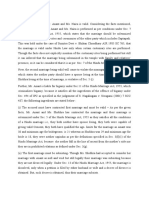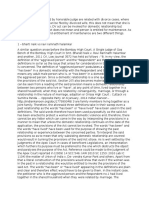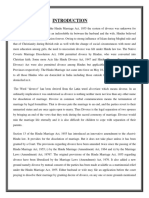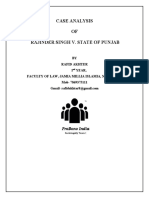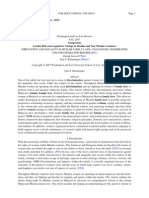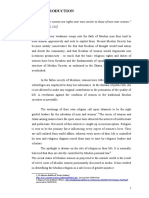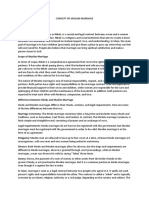Answer 1: in Dr. Abdur Rahim Undre v. Padma Abdur Rahim Undre
Answer 1: in Dr. Abdur Rahim Undre v. Padma Abdur Rahim Undre
Uploaded by
akshauyCopyright:
Available Formats
Answer 1: in Dr. Abdur Rahim Undre v. Padma Abdur Rahim Undre
Answer 1: in Dr. Abdur Rahim Undre v. Padma Abdur Rahim Undre
Uploaded by
akshauyOriginal Title
Copyright
Available Formats
Share this document
Did you find this document useful?
Is this content inappropriate?
Copyright:
Available Formats
Answer 1: in Dr. Abdur Rahim Undre v. Padma Abdur Rahim Undre
Answer 1: in Dr. Abdur Rahim Undre v. Padma Abdur Rahim Undre
Uploaded by
akshauyCopyright:
Available Formats
ANSWER 1
The Triple Talaq pronounced to Aishwarya’s by Salman is Invalid. Aishwarya can be
granted divorce under the provisions of SMA on the grounds of cruelty and can also
be granted maintenance. This shall be substantiated by the following.
1. Is personal Law applicable when Marriage is solemnized under SMA?
The Nature of marriage under SMA is distinguished when compared to other
marriages. This marriage cannot be treated as a marriage under Muslim law as the
requisite essentials have not been fulfilled the foremost being Nikah therefore a
marriage under Muslim law shall have the affect and provisions of Muslim law but not
under SMA. When a marriage is solemnized under the special marriage Act then no
personal law can be applicable irrespective of the conversion status. Under Chapter 6
of the SMA which deals with Nullity and Divorce of marriage Section 27(1) states
that “Subject to the provisions of this Act and to the rules made thereunder, a petition
for divorce may be presented to the district court either by the husband or the wife on
the ground that the respondent” and this provision lays down the grounds for divorce,
since no mention of applicability of personal laws is mentioned it is deemed to be not
applicable and the act says that the solemnization of marriage under this act is subject
to the provisions laid down in this Act. Further-
In Salim Ahmed v Jhuma Bose (M v A) The Delhi High court laid down the law while
answering 2 fundamental questions Whether personal law has a standing when
marriage is under SMA and How is the jurisdiction of the court affected with the
same. Court held-
“Even assuming that the respondent had embraced Islam prior to 20th August, 1998,
it would not in any manner, effect the jurisdiction of the learned Family Court to
entertain and try the petition for divorce under the Special marriage Act.
When a person solemnizes marriage under this law then the marriage is not
governed by personal laws but by SMA. The rights and duties arising out of marriage
are governed by the SMA and the succession is governed by Indian Succession Act,
1925, and not by the personal laws.”
In Dr. Abdur Rahim Undre v. Padma Abdur Rahim Undre, AIR 1982 Bom 341, a
Muslim boy married a Hindu girl on 6th May, 1966 before the Registrar and the
marriage was duly registered under British Marriage Act, 1949. On 20th April, 1978,
the husband gave talaq which was challenged by his wife on the ground that the
marriage in England was performed according to the British Marriage Act, 1949; the
said marriage was a monogamous and secular in nature; the marriage performed under
the secular law of England cannot be dissolved under the personal law as the parties
are governed by Special Marriage Act, and therefore, the alleged talaq was invalid.
The Division Bench of Bombay High Court observed that Special Marriage
Act applies to all Indian Communities irrespective of caste, creed or religion.
In Minoti Anand v. Subhash Anand, 2011 (2) Mh.L.J. 812, the parties solemnized
their marriage under the HMA but subsequently registered the marriage under then
FMA. The divorce petition filed under the HMA was challenged on the ground that
the petition could be filed only under the SMA The Bombay High Court held that the
registration of a marriage under the FMA is conclusive and the provisions of the
SMA would apply. Relevant portion of the said judgment is as under:
“The essence of this very provision is that when one fact becomes or is statutorily
deemed to be conclusive evidence of another fact, any other evidence, which would
disprove such other fact cannot be led.”
In Suman Kundra v. Sanjeev Kundra, AIR 2015 Del 124, the parties were married as
per Hindu rites and ceremonies on 29th October, 1986. However, their love marriage
did not continue very long and the marriage dissolved by a decree of divorce on 02nd
June, 1988. The parties re-married for the second time before the Marriage Officer
under SMA on 03rd May, 1990. However, the parties could not reconcile their
inherent differences and the husband filed a petition for dissolution of marriage
under Section 13(1)(a) and (b) of HMA on 21st July, 2005. The wife challenged the
maintainability of the petition. This Court held that since the parties were married
under the SMA, their conduct with regard to the grant of divorce or relationship would
be covered under the SMA only.
Therefore, on the point of law I have established that when a marriage is solemnized
under SMA only the provisions under it will apply and not their respective personal
laws.
2. Whether Aishwarya can be granted divorce?
Aishwarya can be granted divorce under the special marriage Act on the ground of
cruelty. The position of Cruelty under SMA is the Same as HMA.
In N. Shankar v. Saraswathi the court granted a divorce on the ground of mental
cruelty where the wife used to abuse verbally and yell in public, the court held that
‘Denial of marital comforts to each other undoubtedly leads to mental cruelty’. In this
case also Salman yells outside her house which would be deemed as cruelty. It is well
settled that small petty arguments between husband and wife cannot be considered as
mental cruelty (Tapan Chakravarty v. Anjali Chakravarty). In this it should be
considered that it is no petty quarrel but a serious act of cruelty from the husband to
mis treat her in a drunk state and abuse and yell at her. Mental cruelty in Section 13(1)
(i-a) can broadly be defined as that conduct which inflicts upon the other party
such mental pain and suffering as would make it not possible for that party to live
with the other. In other words, mental cruelty must be of such a nature that the parties
cannot reasonably be expected to live together. There is no specific definition of
mental cruelty. However, Section 13 of the Hindu marriage Act lays a broad
definition. V. Bhagat vs D. Bhagat The court laid down that when there is a no chance
of the marriage being saved, divorce shall be granted in the interest of both parties. It
is very evident by the behaviour of Salman that he isn’t willing to stay in the marriage
therefore the divorce shall be granted, the court was of the opinion that when one
partner in the marriage is causing distress emotionally and mentally it should be
considered as Mental cruelty.
3. Whether Maintenance of 20000 can be granted to Aishwarya?
Maintenace section 37 of the SMA
Maintenance requires — (i) in all cases provisions relating to food, clothes,
housing, education and medical care and treatment; (ii) in the case of an
unmarried daughter also the appropriate expenses and incidents of her
marriage, Section 3(b), Hindu Adoption and Maintenance Act, 1956.
Maintenance should also include a residential provision. Maintenance is
provided to allow the lady to live the way she was accustomed to, more or
less. Therefore, the definition of maintenance must include food and clothing
provision and the like, taking into account the fundamental need of a roof
over the head, Mangat Mal v. Punni Devi, (1995) 6 SCC 88.
Only a woman who is legally married has a right to maintenance. A Hindu
woman who marries a Hindu male who has a living wife is not entitled to
maintenance because the marriage is void, Yamunabai Anantrao Adhav v.
Anantrao Shivram Adhav, (1988) 1 SCC 530.
You might also like
- Muslim Law NotesDocument67 pagesMuslim Law NotesTabish GourNo ratings yet
- Yusuf Rawther v. SawrammaDocument10 pagesYusuf Rawther v. SawrammaJyoti Prabha100% (1)
- Memorial On Behalf of Petitioner of Nehru Memorial Law College National Moot Court CompetitionDocument26 pagesMemorial On Behalf of Petitioner of Nehru Memorial Law College National Moot Court CompetitionRaghav Arora85% (20)
- Rough DraftDocument5 pagesRough DraftUmang Agrawal BATCH 2016 BNo ratings yet
- 222jai Vikrant SinghDocument5 pages222jai Vikrant SinghSinghNo ratings yet
- Family LawDocument5 pagesFamily LawAnika SharmaNo ratings yet
- CASEDocument5 pagesCASEaman khanNo ratings yet
- Document 37Document9 pagesDocument 37ShreeNo ratings yet
- Chapter-IX: Maintenance of Wives, Children and ParentsDocument7 pagesChapter-IX: Maintenance of Wives, Children and ParentsHJ ManviNo ratings yet
- Chapter-I: 1 Satayjeet, A. Desai, Mulla's Principles of Hindu Law, V. II (1998, 17th Ed,)Document11 pagesChapter-I: 1 Satayjeet, A. Desai, Mulla's Principles of Hindu Law, V. II (1998, 17th Ed,)Satyam MishraNo ratings yet
- All The Judgments Shared by Honorable Judge Are Related With Divorce CasesDocument4 pagesAll The Judgments Shared by Honorable Judge Are Related With Divorce CasesmukhiNo ratings yet
- Mayank Singh LRSDocument14 pagesMayank Singh LRSVipulaakshNo ratings yet
- Legal Language and Legal Writing 18 Marks Answers.Document75 pagesLegal Language and Legal Writing 18 Marks Answers.sir bibjbNo ratings yet
- Maintenance Under CRPCDocument9 pagesMaintenance Under CRPCAshwani PatelNo ratings yet
- Grounds For Divorce Under Hindu Marriage ActDocument22 pagesGrounds For Divorce Under Hindu Marriage ActRitesh KumarNo ratings yet
- Grounds For Divorce Under Hindu Marriage ActDocument22 pagesGrounds For Divorce Under Hindu Marriage ActrajNo ratings yet
- Hindu Marriage-2-1Document14 pagesHindu Marriage-2-1abhijith nairNo ratings yet
- AdulteryDocument6 pagesAdulteryABHISHEK ANANDNo ratings yet
- FamilyDocument14 pagesFamilyAnkit SharmaNo ratings yet
- Kusum Vs State of UpDocument2 pagesKusum Vs State of UpAbhinav BansalNo ratings yet
- Wa0008.Document4 pagesWa0008.Urvashi SharmaNo ratings yet
- Khushi Choudhary - Sec ADocument5 pagesKhushi Choudhary - Sec AKhushi ChoudharyNo ratings yet
- Shriya FamilyDocument11 pagesShriya FamilyShriya ChandankarNo ratings yet
- Sem V - Family LawDocument93 pagesSem V - Family Lawsakthilaxman02No ratings yet
- Cases End SemDocument19 pagesCases End SemDevansh SharmaNo ratings yet
- A Critical Analysis of The Shah Bano CasDocument7 pagesA Critical Analysis of The Shah Bano Casvijaya choudharyNo ratings yet
- Memorial Respondent s8Document16 pagesMemorial Respondent s8anaghaNo ratings yet
- Dissolution of Hindu MarriageDocument13 pagesDissolution of Hindu MarriageKumar MangalamNo ratings yet
- Shah Bano 125Document6 pagesShah Bano 125harshvardhanm270No ratings yet
- Landmark Judgements On Hindu Marriage ActDocument9 pagesLandmark Judgements On Hindu Marriage ActIshitaNo ratings yet
- New Microsoft Word DocumentDocument40 pagesNew Microsoft Word DocumentvijaylakshmiNo ratings yet
- Research Paper On Dissolution of MarriageDocument20 pagesResearch Paper On Dissolution of MarriageDominus AdvocatusNo ratings yet
- Family Law - I, Abhishek SinghDocument28 pagesFamily Law - I, Abhishek SinghSinghNo ratings yet
- Sem V - Family LawDocument103 pagesSem V - Family LawPetchi MuthuNo ratings yet
- Theories of DivorceDocument13 pagesTheories of DivorceRahul ChurendraNo ratings yet
- Anuradha Samir Vs Mohandas Samir, 2015Document7 pagesAnuradha Samir Vs Mohandas Samir, 2015Sundaram OjhaNo ratings yet
- Rights of Women During Divorce in IndiaDocument23 pagesRights of Women During Divorce in IndiaZuhair SiddiquiNo ratings yet
- Uslim AW: Khurshid Ahmad Khan vs. State of UP 2015 Supreme CourtDocument22 pagesUslim AW: Khurshid Ahmad Khan vs. State of UP 2015 Supreme CourtYash GargNo ratings yet
- 10 - Chapter 4 - 3 PDFDocument30 pages10 - Chapter 4 - 3 PDFPritam AnantaNo ratings yet
- Divorce and MainteneceDocument13 pagesDivorce and MainteneceHimalaya0% (1)
- Ans of Family Law II Class TestDocument8 pagesAns of Family Law II Class TestPrachi DhuriNo ratings yet
- Family Law 2 (Muslim Law) Part - CDocument14 pagesFamily Law 2 (Muslim Law) Part - CRohith Anumandla100% (1)
- BIGAMY Law of CrimeDocument5 pagesBIGAMY Law of Crimekhatriparas71No ratings yet
- In Adultery and DivorcesDocument1 pageIn Adultery and Divorcesakstudios07No ratings yet
- ArgumentsDocument6 pagesArgumentsNihas TNo ratings yet
- ClaimantDocument5 pagesClaimanthira bibiNo ratings yet
- Conditions of Marriage & The Doctrine of Factum ValetDocument12 pagesConditions of Marriage & The Doctrine of Factum Valetmihir khannaNo ratings yet
- Family Law - Ii: Assignment No.: 5Document5 pagesFamily Law - Ii: Assignment No.: 5Aman jainNo ratings yet
- Division: Case 1: 2 Even Though A Person Has Been Convicted by A Court, He Is Still Allowed To Fight Elections. Justify With Case AnalysisDocument9 pagesDivision: Case 1: 2 Even Though A Person Has Been Convicted by A Court, He Is Still Allowed To Fight Elections. Justify With Case AnalysismillsNo ratings yet
- Marriage in Hindu LawDocument11 pagesMarriage in Hindu LawVaibhav ChaudharyNo ratings yet
- Case CitationDocument6 pagesCase CitationNivedha SNo ratings yet
- Legal Effect of Marriage Lecture 2Document6 pagesLegal Effect of Marriage Lecture 2Jr NeyNo ratings yet
- Muslim Law AssisgmentDocument4 pagesMuslim Law AssisgmentaykhhanaykhanNo ratings yet
- Case Analysis OF Rajinder Singh V. State of PunjabDocument12 pagesCase Analysis OF Rajinder Singh V. State of PunjabP TejeswariNo ratings yet
- 20BBL001-CEII-Family Law IDocument9 pages20BBL001-CEII-Family Law IAbhay ParmarNo ratings yet
- Family Law Sem 4 Assignment (Mohd Kamran Ansari 20BLW039)Document9 pagesFamily Law Sem 4 Assignment (Mohd Kamran Ansari 20BLW039)Mo Kamran AnsariNo ratings yet
- Conflict of LawsDocument11 pagesConflict of LawsPankaj KumarNo ratings yet
- Rayat College of Law, Railmajra. Family Law Project: Submitted To: Submitted byDocument11 pagesRayat College of Law, Railmajra. Family Law Project: Submitted To: Submitted bysamridhi chhabraNo ratings yet
- Hindu LawDocument20 pagesHindu LawFaisal HassanNo ratings yet
- Table of SharesDocument3 pagesTable of SharesakshauyNo ratings yet
- Akshay G Subramoniam 2150504 - Research Paper Cia 3Document6 pagesAkshay G Subramoniam 2150504 - Research Paper Cia 3akshauyNo ratings yet
- Akshay 2Document16 pagesAkshay 2akshauyNo ratings yet
- Arguments For Issue 3 and 4 Petitioner Side - 2Document3 pagesArguments For Issue 3 and 4 Petitioner Side - 2akshauyNo ratings yet
- BY: 2150503 Advait Natesan 2150522 N R BRIJESHDocument10 pagesBY: 2150503 Advait Natesan 2150522 N R BRIJESHakshauyNo ratings yet
- ISSUE 3 ImcDocument2 pagesISSUE 3 ImcakshauyNo ratings yet
- AKSHAY G SUBRAMONIAM 2150504 - CIA 3 Law of Contract-1Document5 pagesAKSHAY G SUBRAMONIAM 2150504 - CIA 3 Law of Contract-1akshauyNo ratings yet
- Inrr - 113 - RespondentDocument16 pagesInrr - 113 - RespondentakshauyNo ratings yet
- Muslim Law by Syed Khalid Rashid's Introductory Page & Chapter 1 PDFDocument234 pagesMuslim Law by Syed Khalid Rashid's Introductory Page & Chapter 1 PDFAtiya100% (1)
- Westlaw Document 02-42-29Document16 pagesWestlaw Document 02-42-29muzhaffar_razakNo ratings yet
- Muti Lecture2onPFRMarriageROPRofSpouses 1Document86 pagesMuti Lecture2onPFRMarriageROPRofSpouses 1Najerah P. CosainNo ratings yet
- Case Digest - SumagkaDocument2 pagesCase Digest - SumagkaGom BearNo ratings yet
- In The Honourable High Court of MaharashtraDocument14 pagesIn The Honourable High Court of MaharashtraTANMAYA GUPTANo ratings yet
- Harta SepencarianDocument3 pagesHarta SepencarianhaaziqNo ratings yet
- Exam CasesDocument14 pagesExam CasesDileep ChowdaryNo ratings yet
- Nikah HalalaDocument10 pagesNikah HalalaaryanNo ratings yet
- The 3 Ds2 - Dessertion, Divorce and DoweryDocument124 pagesThe 3 Ds2 - Dessertion, Divorce and DoweryThahira IqbalNo ratings yet
- A. CASE-Shayara Bano Vs Union of IndiaDocument1 pageA. CASE-Shayara Bano Vs Union of IndiaDIVYANSH SISODIYANo ratings yet
- DISSERTATIONDocument144 pagesDISSERTATIONnitin0010No ratings yet
- Case Study Danial Latifi v. UOIDocument3 pagesCase Study Danial Latifi v. UOIbaradiastutiscribd100% (2)
- PD 1083 Marriage ReviewerDocument9 pagesPD 1083 Marriage ReviewerDawn Jessa Go50% (2)
- 3 3 47 515Document45 pages3 3 47 515narendra kumarNo ratings yet
- Interview QuestionsDocument9 pagesInterview QuestionsVanshita GuptaNo ratings yet
- ADR. Muslim Family Laws Ordinance 1961Document12 pagesADR. Muslim Family Laws Ordinance 1961priyanka100% (2)
- PubertyDocument57 pagesPubertyWiweck Naik100% (1)
- Marriage and Divorce ActDocument29 pagesMarriage and Divorce ActNishard50% (2)
- Social Difference Online Vol.1 2011Document86 pagesSocial Difference Online Vol.1 2011Man JianNo ratings yet
- Concept of Muslim MarriageDocument7 pagesConcept of Muslim MarriageLMRP2 LMRP2No ratings yet
- Tabrej SirDocument8 pagesTabrej SirFatima ZehraNo ratings yet
- Khula: Women's Right To DivorceDocument8 pagesKhula: Women's Right To DivorceAhmed Shah HussainNo ratings yet
- Petitioner P2 MemorialDocument18 pagesPetitioner P2 MemorialSD60% (5)
- Post Divorce MaintenanceDocument3 pagesPost Divorce MaintenanceZafar AzeemiNo ratings yet
- Response To The Lies and Distortions of Christian Missionaries About The Position Of-KevinDocument17 pagesResponse To The Lies and Distortions of Christian Missionaries About The Position Of-KevinMateen YousufNo ratings yet
- Family Laws in Pakistan PDFDocument2 pagesFamily Laws in Pakistan PDFDoris20% (5)
- Law of Divorce in Pakistan (Article)Document9 pagesLaw of Divorce in Pakistan (Article)Aasim MatloobNo ratings yet
- Divorce Procedures and Laws in PakistanDocument6 pagesDivorce Procedures and Laws in PakistanSanaNo ratings yet





